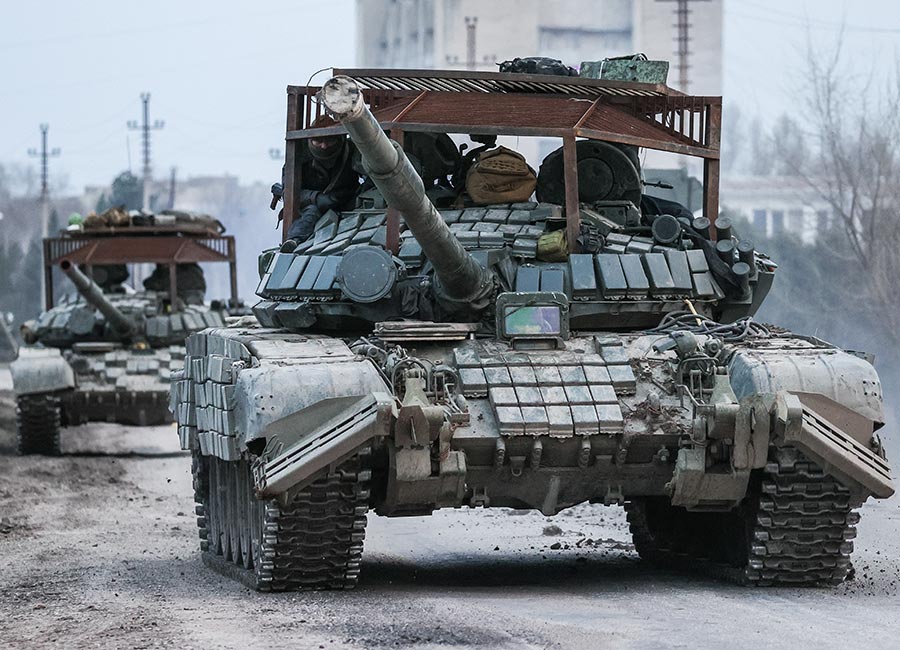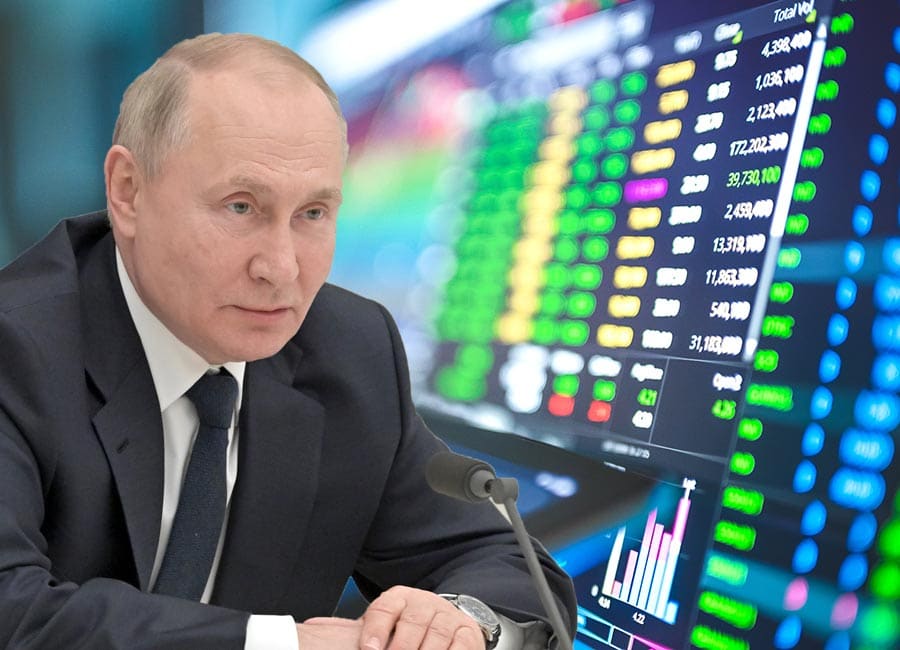As oil prices rise and stocks across the world react to Russia's invasion of Ukraine we ask for expert advice on what to do with your stocks.
Petrol prices up to €2 per litre, gas prices doubling and food inflation spiralling further - those are the possible direct implications of Russia's invasion of Ukraine.
However, investors breathed a sigh of relief after an initial plunge in share prices on Thursday was mainly reversed on Friday.
And some experts predicted that the crisis will lead to the European Central Bank holding off on increasing interest rates until 2023. A hike had been expected later this year.
The shocking sight of Russian tanks rolling across the Ukraine border sent shares markets into a tailspin on Thursday, hitting our pensions and investments.
Oil broke through the $100 a barrel barrier, hitting $105 at one point and wholesale gas prices rose as much as 42% on Thursday, but share prices then rebounded early on Friday as the prospect of sanctions appeared more limited than previously thought - though oil and gas maintained their upward pressure towards the weekend.
'Outside of supplying energy to western Europe the Russian/ Ukrainian bloc is not a major component in the global economy and thus the impact on global growth should be marginal,' said Bernard Swords, chief investment officer of Goodbody stockbrokers.
Russian-exposed stocks have taken the brunt of the sell-off, with the likes of Chelsea owner Roman Abramovich's Evraz losing more than a quarter of its value at one point. He also faced calls to be stripped of his right to own a football club after documents linked him to Vladimir Putin's regime.

Investors have been urged not to panic sell in a fast-falling market. But they were also warned against knee-jerk attempts to snap up shares they see as bargains when the dust has yet to clear on what could be a long and bloody war.
Oil and gas prices are 'likely to stay highly elevated', while banks, mining and travel stocks are likely to remain under pressure, said Susannah Streeter, senior analyst at Hargreaves Lansdown.
Investors are probably 'seeking out more defensive positions', but she encouraged home traders to 'keep their nerve and have an eye on the longer horizon'.
She explained: 'The shock of conflict is devastating, but history does point to relatively short-lived volatility on financial markets.'
Other experts warned that the hike in energy prices was the last thing the world needed as the spectre of inflation loomed large once more. Not all advisers were taking the standard 'hold-your-nerve' line.
FundExpert's Brian Dennehy gave a quite startling recommendation, advising investors to move substantially into cash.
'After Russia's invasion of Ukraine earlier this morning, we are recommending that investors move to 50% cash. It is a time of red alerts for markets, for Ukraine, for energy prices and supplies, for inflation, and for supply chains,' he said.
'That there is a sweep of vulnerabilities is well understood by Vladimir Putin. This means that now is a sweet-spot for Putin to fulfil his ambitions (though precisely what those might be remains unclear). Market falls of 50% and more can be expected, particularly when you factor in the other crises mentioned above.'
Mr Dennehy has a 10-point emergency plan for worried investors (but bear in mind that many investors lose out when they panic and that selling can be a costly decision if it proves to be the bottom of the market):
1. Decide NOW if your attitude to investment risk has changed.
2. Accept the possibility markets can go down to a level which does not fit with your life plans.
3. Make a plan to deal with your investments falling. If this is a shock you can't handle, you need a plan with some very specific action points. Let's look at those now:
4. Reduce the number of your investments, whether funds or individual stocks. Cut this to a maximum of 15, but as low as possible. The more holdings you have, the harder you will find it to take action when markets fall. This will help you with the next task.
5. Apply the simple but powerful 'overnight test'. Assume someone sold all of your investments tonight without your knowledge, and tomorrow you woke up with 100% in cash. Here's the test: You can re-purchase the same investments at no cost. a) Which would you re-purchase? b) What changes would you make? Go and practice some selling now, because practice makes perfect.
6. No fund holding should have a value less than 5% of your total portfolio value. If the value of any one fund is less than 5% of your total portfolio, it is highly unlikely to have much impact on the progress of your portfolio as a whole - so have a smaller number of fund holdings, of greater value.
7. Once extreme valuations and behaviour are evident, increase cash levels.
8. Have a clear stop-loss strategy and make sure you apply it. With a stop-loss you literally stop your loss from getting bigger. For each investment, decide how far the value must fall to trigger you into selling it.
9. Don't go on holiday and be out of contact with markets if you have large investments.
Make sure you have all your account details and holdings with you in paper form. If you normally only trade online, ensure your broker or adviser has a telephone dealing service.
10. Keep on top of the practicalities. Know what time of the day your broker or adviser trades in funds. If it's 8.30am and you ring at 9am, you are already 24-48 hours behind market prices.
Images: Getty








